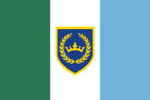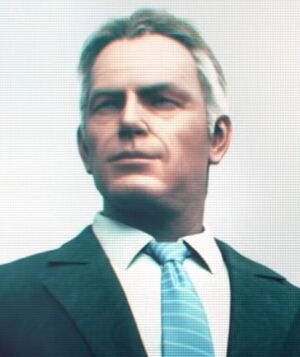Chancellor of Brumen
This article is incomplete because it is pending further input from participants, or it is a work-in-progress by one author. Please comment on this article's talk page to share your input, comments and questions. Note: To contribute to this article, you may need to seek help from the author(s) of this page. |
| Chancellor of the Kingdom of Brumen | |
|---|---|
| Kanzler des Königreich Brumen | |
 Royal Arms of Her Majesty's Government | |
 Flag of Brumen | |
| Executive Branch of the Government | |
| Style | The Honourable (Formal) His Excellency (Diplomatic) Mr. Chancellor (Informal) |
| Status | Head of Government |
| Member of | Parliament Royal Cabinet Royal Council Royal Security Committee |
| Reports to | Monarch of Brumen Parliament |
| Seat | Dinsmark |
| Nominator | Congress of the Realm |
| Appointer | Monarch of Brumen |
| Term length | At Her Majesty's pleasure |
| Constituting instrument | Articles of Union |
| Formation | 24 April 1850 |
| Deputy | Vice Chancellor of Brumen |
| Salary | $250,000 |
The chancellor of Brumen, officially the chancellor of the Kingdom of Brumen, is the head of government of the Kingdom of Brumen and serves, on behalf of Brumen's Monarch, as the commander-in-chief of Brumen's Armed Forces. The chancellor is nominated by the Congress of the Realm as the person who commands the confidence of parliament. This is generally the leader of the largest party in parliament who has successfully formed government, be it by majority or through a coalition agreement. Once nomination by Congress has been confirmed, the Chancellor-nominee would seek an audience with the reigning Monarch to seek their formal appointment as Chancellor and permission to form government. Aside from sitting as a member of parliament (MP) the chancellor also leads various high offices in the federal government such as, but not limited to the: Royal Cabinet, Royal Council & Royal Security Council. The incumbent chancellor is Immanuel von Dinsmark who has been in office since 15 December 2007.
History
Prior to the creation of the office & position of chancellor, Brumen was ruled as an absolute parliamentary constitutional monarchy, where the Monarch held all executive powers within the confines of the established constitution. Talks of separating powers from the King to an elected Chieftain amongst the council of chieftains dates back prior to Brumen's establishment in 1305. However, Waldreich's influence over the other realms and its victories during the Second Blühen Wars and against the Audonian Invasions, allowed its monarch to retain its powers.
The office and position of chancellor of Brumen was established in 1851, a result of the aftermath of the Second Insurrection, a period of civil war which resulted in the democratization of Brumen. One of the many grievances which triggered the insurrection was the centralization of executive power in the Monarch. While some powers of the Monarch was ceded to the Oberhaus after the First Insurrection, Monarchs of Brumen continue to enjoy near total control over all executive functions of the government. As part of the Second Reformation, most executive powers were transferred to the office & position of chancellor.
As a result of the Second Reformation, Monarchs of Brumen became the ceremonial head of state of the Kingdom, whereas the chancellor would be the head of government. Any powers and functions which were not explicitly transferred to the office of chancellor from the Monarch became known as reserve powers of the crown. These reserve powers included the ability to dissolve parliament though this could only be done under the advise of the chancellor.
